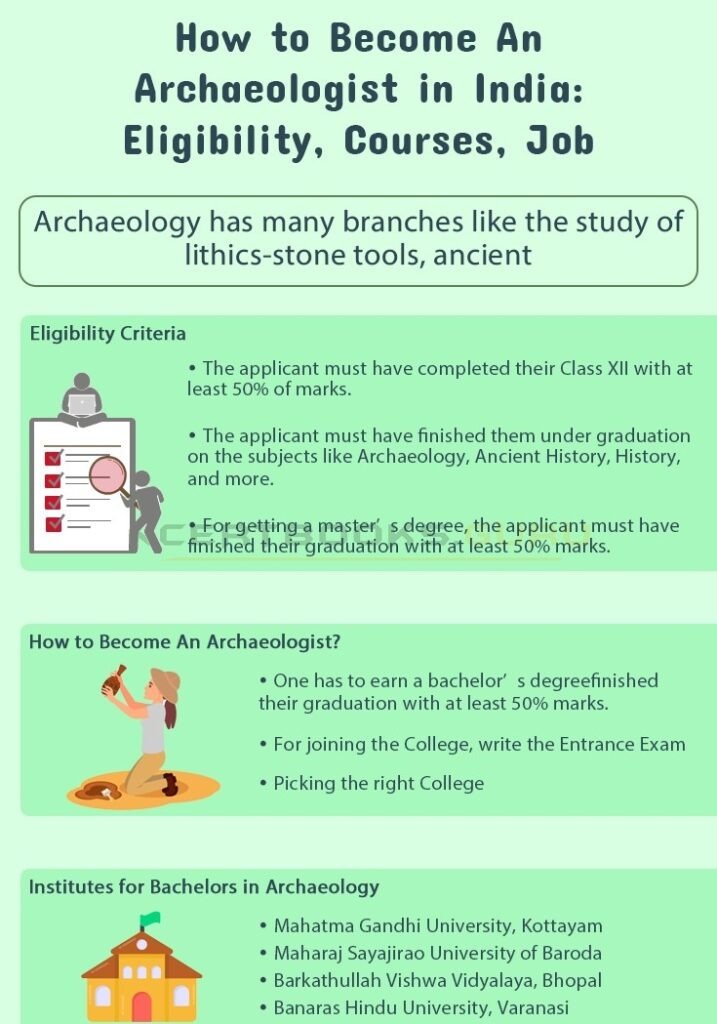Archaeology is the study of ancient or recent human history via material remains. It’s also a sub-discipline of Anthropology, which deals with the study of all human cultures. Archaeology is derived from the Greek word “archaeologic,” which means “ancient history.”
Also, See:
- Job Oriented Courses After 12th
- How to Become an Android Developer in India
- How to become a BDO in India
Contents
- What Exactly are Archaeologists?
- How to Become an Archaeologist in India after 12th
- Archaeologist Academic Requirements Eligibility
- Archaeologist Job Requirements
- In-Depth Archaeologist Career
- Archaeologist’s Various Job Functions
- Archaeologists’ Top Recruiting Firms
- Archaeologist’s Salary in India
- Archaeology Courses in India
- Archaeologists Have a Lot of Opportunities in India
What Exactly are Archaeologists?
Archaeologists are scientists who investigate the relics of former civilizations and groups of people. The research items such as dwellings, clothing, tools, bones, crockery, and other artifacts left behind by people who lived a long time ago.
Archaeologist collects numerous sorts of evidence from various locations and observes and examine the results. If you want to be an archaeologist, you must have a thorough understanding of history and geography.
How to Become an Archaeologist in India after 12th

A Step-by-Step Guide: When selecting to attend an archaeology course and choose to become an archaeologist in the future, students must examine a few factors, which begin with this decision and end with college selection.
The steps of becoming an archaeologist in India after 12th grade are outlined here.
Step 1: Decide on your academic future.
Students can pick archaeology as a field of study before or after deciding on a stream in class 12 or even after completing class 12. Students can pick Humanities or Social Science subject combinations in class 12 if they know what they want to study.
However, students from any stream in class 12 are allowed to take Archaeology classes, albeit individuals with a humanities background will have an advantage.
Step 2: Select a degree
After 12th grade, students can enroll in Bachelors of Archaeology, Ancient History, Cultural Heritage, or a related degree in History to pursue a career as an archaeologist. However, if a student wants to be a Marine Archaeologist, they must have a degree in Engineering.
After completing an undergraduate degree, individuals can pursue a master’s degree and eventually a doctorate in archaeology in India.
3rd step: Entrance Exam Preparation
The majority of BA Archaeology or diploma program admissions are merit-based. Various prominent colleges, on the other hand, hold entrance tests for bachelor’s degree admission. AUCET, BHU PET, and IPU CET are some of the state entrance tests, which are followed by personal interviews.
In the event of MA admission, universities conduct personal interviews in which the research papers and thesis from the bachelor’s degree are a plus. As a result, students should study according to the most recent exam curriculum.
Step 4: Choosing a college
The difficult aspect is deciding on a college. Graduates must have extensive field experience to be successful archaeologists. As a result, when applying to colleges, students should look for those that provide good on-the-job training and internship opportunities.
Banaras Hindu University in Varanasi is one of India’s premier archaeological institutions. Field archaeology, Classical archaeology, Bioarchaeology, and Prehistoric archaeology are some of the specializations available in Archeology.
Step 5: Acquire the skills you’ll need
Archaeologists investigate the items that people from the past left behind, such as their homes, clothes, equipment, bones, utensils, and so on. Excavators collect various proofs of human history from various locations and study and analyze the results. To become an archaeologist, one must have a thorough understanding of history and topography.
- The following are some of the abilities that an archaeologist is expected to have:
- Excellent research,
- writing,
- communication skills are required.
- Strong teamwork skills and an eye for detail
Archaeologist Academic Requirements Eligibility
Interested students can take a variety of archaeological courses, including a Bachelor of Arts in Archaeology and Museology or a Master of Arts in Archaeology.
The following are the essential prerequisites for taking an archaeological course in India after the 12th grade:
- To pursue a diploma course, a potential applicant must pass the 10+2 examination from a recognized education board.
- A candidate for an undergraduate program in archaeology must have completed 12th grade with a 55 percent average in fields such as Geography, History, Anthropology, Geology, Art, and Literature. However, each institution’s cut-off varies. Students who did not choose humanities but still wish to pursue archaeology can easily change their undergraduate major to humanities.
- Candidates for the two- to the three-year postgraduate program must have completed their undergraduate studies in the relevant fields.
It is best to study Humanities in 11th and 12th grade if you want to pursue archaeology as a career. History, Anthropology, and Sociology, among other subjects, provide a strong foundation for a career in archaeology. To work as an archaeologist, you must have a bachelor’s degree in archaeology, anthropology, geology, or history, as well as a master’s degree in archaeology and historical studies.
Students who do not have (or did not choose) humanities as a major but yet want to pursue archaeology can easily major in humanities. It’s a good idea to double-check a college’s eligibility and curriculum, as each one has its own set of requirements.
Archaeologists have a strong desire to learn more about their history and ancestry, as well as to preserve their roots. Apart from that, an archaeologist should have an alert mind, a flair for study, meticulous attention to detail, patience, and resilience.
Archaeologist Job Requirements
- Skills are necessary for every aspect of life, especially in the workplace. A person’s career is balanced by technical and soft talents.
- An archaeologist must possess the following abilities.
- An archaeologist should be dedicated to his profession and industrious.
- A job in archaeology necessitates a high level of foresight and an in-depth understanding of the field.
- One should be able to work hard while remaining committed, open-minded, and honest.
- They must be well-organized and pay close attention to the smallest of details.
- During fieldwork, an archaeologist must be able to work well with others.
- A technical understanding of the numerous types of equipment utilized during on-field operations is required of an archaeologist.
In-Depth Archaeologist Career
When most people think of archaeologists, they envision a group of people digging up the ground with instruments in hand, but archaeology is much more than that. An archaeologist is a person who uses archaeological studies to try to discover and analyze the past of human civilizations.
An archaeologist studies the beliefs, social structure, economic organization, and environmental effects of human cultures or civilizations. This field aids in the visualization of the past and allows us to gain a better knowledge of our forefathers’ beliefs as well as the culture and society in which they lived.
As a result, archaeologists are researchers who look into the relics of past human gatherings and developments. The importance of archaeology is expanding with the help of modern technology and the tendency of millennials towards unorthodox vocations like archaeology.
For someone with an analytical mind and a strong desire to learn about former human civilizations, archaeology is a rewarding and hard vocation.
Archaeologist’s Various Job Functions
Archaeologists can work in a variety of settings. The archaeologist’s traditional image as a university professor or museum director is no longer accurate. An archaeologist’s career path is not limited to a single field or domain; in fact, their work might take them all over the world, with job opportunities not just in India but also worldwide.
The many job duties of an archaeologist in India are listed below.
- Urban Archaeologist Museum/Gallery Exhibition Officer
- Archaeologists specializing in the prehistoric period
- Paleontologist
- Archaeologist of the Seas
- Archaeologists of the Environment
- Lecturer in Documentation Specialist
- An archaeologist who conducts experiments
Archaeologists’ Top Recruiting Firms
An archaeologist can work for the government in a variety of capacities. The Archaeological Survey of India is the main source of employment (ASI). In the private sector, however, archaeologists can find work in a variety of fields.
The following are some of the most well-known organizations that hire archaeologists.
- The Indian Council of Historical Research is a non-profit organization dedicated to historical research
- Museums of the United States
- Universities and colleges, both public and private
- Museums, both public and private
- Agencies in Charge of National Heritage
- Galleries of Culture
Archaeologist’s Salary in India
As there is a high demand for Archeologists around the world and a supply that is significantly smaller than the market, these experts can expect to be paid well by their employers.
For starters, a newcomer might expect a monthly income of INR 20,000 to 30,000. Qualified and experienced professionals, on the other hand, can earn a pay package ranging from INR 5 lakhs to INR 9 lakhs per annum.
Archaeology Courses in India
A degree in archaeology is an interesting opportunity to work while also learning about history. Students can gain new skills by participating in monument repair and exploring the country’s historical history one step at a time through these courses. Depending on the degree and expertise, the courses listed below can last anywhere from two to three years.
The most popular archaeology courses in India are shown here.
- BA (Ancient Indian Culture)
- BA (Ancient Indian Culture)
- BA (Ancient Indian Culture)
- MA in Archeology and Museology
- MA Archeology
- MA Archeology
- MA Archeology
- MA Archeology
- MA Arch
Archaeologists Have a Lot of Opportunities in India
As a result of great empires such as the Mughals, the Maurya’s, and others, India is home to one of the most well-planned ancient cities ever, as well as ancient monuments imprinted on its map. Qualified archaeologists are in high demand in both corporate and public organizations. A graduate in archaeology can work as a tourist guide, heritage manager, and so on.
Excavation, Prehistory, Underwater Archeology, Museums, Temple surveys, and so on are all branches of the ASI. Its activities require a large number of qualified archaeologists, epigraphists, conservators, and scholars.
Archeologists are recruited by a variety of organizations, including the Indian Council of Historical Research, the National Museum, Private and Public Museums, and Universities.
How can I become an Archaeologist in India?
You should have a bachelor’s and master’s degree in Archaeology to be eligible for this post. If you want to work as an academician, you should have a P. Hd. Degree also.
What subjects should you choose to become an Archaeologist?
You must have History, Anthropology, Sociology, Archaeology, and Geology.
Is it worth studying Archaeology?
Jobs of archeologists are projected to grow 7 percent from 2020 to 2030. So it is beneficial for you to study Archaeology.

